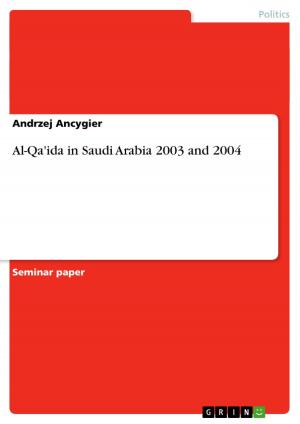The Palestinian Hamas between islamic religious tradition and modernity
Nonfiction, Religion & Spirituality, Middle East Religions, Islam| Author: | Oliver Borszik | ISBN: | 9783638804080 |
| Publisher: | GRIN Publishing | Publication: | June 15, 2007 |
| Imprint: | GRIN Publishing | Language: | English |
| Author: | Oliver Borszik |
| ISBN: | 9783638804080 |
| Publisher: | GRIN Publishing |
| Publication: | June 15, 2007 |
| Imprint: | GRIN Publishing |
| Language: | English |
Scientific Essay from the year 2006 in the subject Orientalism / Sinology - Islamic Studies, grade: eins, University of Hamburg (Asien Afrika Institut), course: Radical Islam, 24 entries in the bibliography, language: English, abstract: The article deals with the following questions: what does modernity mean for Hamas in the Middle East and how is Hamas responding to the extensive social and political changes and challenges of modern times? To which extent do significant inconsistencies result from the Islamist movement's forceful adherence to the Islamic religious tradition (naql) on the one side and the diversity of modernity's manifestations on the other side? In many respects, Hamas as a radical movement has to do with modernity revealing itself for the Palestinians in the Middle East. For Hamas, the Israeli-Palestinian conflict is, above all, a conflict with modernity. In this conflict, Hamas, on the one hand, acts as an adaptive, modern movement. On the other hand, it reveals its radical nature, claiming the indisputable monopoly on the interpretation of the Islamic religious tradition. While attempting to bring the Israeli-Palestinian negotiations back to the starting point after the 1967 war - after the unsuccessful period of unequal and unilateral negotiations between the Israelis and Arafats Fatah - Hamas aims at improving the fate of the Palestinian people by establishing an Islamic system (niz?m isl?m?). This is precisely the main preoccupation of the movement's social and from now on also political commitment. However, in order to achieve its objectives and to lead promising negotiations with Israel as well as with the four secular agents involved in the Middle East conflict, Hamas must undergo a process of reflection about its cultural and religious identity. Only by means of such an internal process can Hamas exert a positive impact on Palestinian politics.
Scientific Essay from the year 2006 in the subject Orientalism / Sinology - Islamic Studies, grade: eins, University of Hamburg (Asien Afrika Institut), course: Radical Islam, 24 entries in the bibliography, language: English, abstract: The article deals with the following questions: what does modernity mean for Hamas in the Middle East and how is Hamas responding to the extensive social and political changes and challenges of modern times? To which extent do significant inconsistencies result from the Islamist movement's forceful adherence to the Islamic religious tradition (naql) on the one side and the diversity of modernity's manifestations on the other side? In many respects, Hamas as a radical movement has to do with modernity revealing itself for the Palestinians in the Middle East. For Hamas, the Israeli-Palestinian conflict is, above all, a conflict with modernity. In this conflict, Hamas, on the one hand, acts as an adaptive, modern movement. On the other hand, it reveals its radical nature, claiming the indisputable monopoly on the interpretation of the Islamic religious tradition. While attempting to bring the Israeli-Palestinian negotiations back to the starting point after the 1967 war - after the unsuccessful period of unequal and unilateral negotiations between the Israelis and Arafats Fatah - Hamas aims at improving the fate of the Palestinian people by establishing an Islamic system (niz?m isl?m?). This is precisely the main preoccupation of the movement's social and from now on also political commitment. However, in order to achieve its objectives and to lead promising negotiations with Israel as well as with the four secular agents involved in the Middle East conflict, Hamas must undergo a process of reflection about its cultural and religious identity. Only by means of such an internal process can Hamas exert a positive impact on Palestinian politics.















